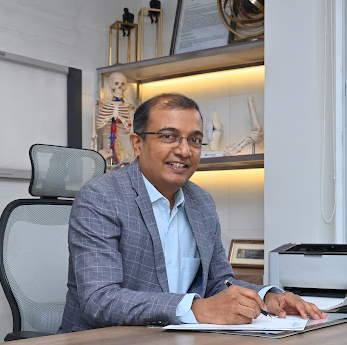Partial Knee Replacement Cost in Pune
Partial knee replacement cost in Pune are affordable and can be managed through financial aid. The city is known for its excellent medical services and procedures. The recovery of the knee joint is crucial due to its size and weight-bearing role. Injuries to the knee can cause significant discomfort.
We will cover the cost of partial knee replacement surgery in Pune and hospitals you can refer to. At the end of this article, you will be fully prepared with a plan to cover the procedure.
About Partial Knee Replacement
Partial knee replacement surgery is an operation that involves replacing only a specific part of a damaged knee. This surgery targets either:
The inner (medial) section
The outer (lateral) part
The kneecap portion of the knee joint
It's a solution for cases where arthritis affects only a portion of the knee.
During partial knee replacement surgery, damaged tissue and bone are replaced with a prosthetic implant. This procedure offers advantages such as smaller incisions and shorter recovery periods compared to complete knee replacement.
It is also known as partial knee resurfacing or unicompartmental knee replacement. The surgery takes about 60-90 minutes, and patients typically stay in the hospital for 4-6 days. Anaesthesia options include general or regional (spinal or epidural) anaesthesia.
Partial Knee Replacement Cost in Pune Overview
If you are considering partial knee replacement cost, the associated prices are the most critical aspect to care for. Here is an overview of the expense range:
Unicompartmental Knee Replacement | Cost Range |
Maximum Cost | ₹ 5,00,000 |
Average Cost | ₹ 3,00,000 |
Minimum Cost | ₹ 1,62,000 |
Note: These are approximate costs. Please contact your preferred hospital for a price range specific to your case.


Best Doctors for Partial Knee Replacement in Pune (10)
Top Hospitals for Partial Knee Replacement in Pune (9)


Partial Knee Replacement Cost Breakup in Pune
Being aware of the factors that influence healthcare costs can help the procedure go more smoothly. As a result, here is a breakdown of partial knee replacement cost in India, specifically in Pune:
Expense Components | Price Estimate |
Implant Cost Note: The price varies depending on the implant manufacturer and side, whether unilateral or bilateral. | ₹ 45,000 to ₹ 80,000 |
Doctor Visit | ₹ 1,500 to ₹ 2,000 |
Surgeon Fee | ₹ 90,000 |
Anaesthetist Fee | ₹ 27,000 |
Assistant Charge | ₹ 45,000 |
Nursing Charge (per day) | ₹ 800 to ₹ 1,000 |
Drugs and Consumables Note: Cost excluding the implants. | ₹ 20,000 to ₹ 35,000 |
OT Charge | ₹ 45,000 |
Investigations | ₹ 10,000 to ₹ 15,000 |
Room Rent (per day) Note: The stay is divided as follows:
| ₹ 5,000 to ₹ 8,000 |
Physiotherapy (post-surgery) | |
Per day | ₹ 800 to ₹ 1,200 |
In total Note: Carried out mostly for 4-6 weeks | ₹ 30,000 to ₹ 45,000 |
Note: These are approximate amounts. Please contact the hospital for an exact amount.
Factors that Affect Partial Knee Replacement Cost in Pune
Knowing the factors influencing the cost of partial knee replacement surgery in Pune is critical for planning and making decisions. Given below is an overview of the various expense-influencing components:
Hospital Choice: The fees for various facilities vary. Due to their services and advanced technology, high-end medical centres may be more expensive.
Implant Quality: The type and brand of implant used in surgery can affect the overall cost. High-end brands like Zimmer Biomet, Stryker, and Johnson & Johnson are commonly used for artificial knee implants, impacting prices.
Implant Type: The total expense of surgery also varies depending on the type of implant used. These can be metallic, ceramic, plastic, or a combination of the following:
Titanium alloy
Oxidised zirconium (OxZr) alloy
Cobalt chromium (CoCr) alloy
Polyethene crosslinked polyethene or highly crosslinked polyethene
Note: Each material has a specific cost. This only applies to one side and one component.
Surgeon's Fee: Experienced specialists frequently charge higher fees. Their experience and track record may have an impact on the overall cost.
Diagnostic Tests: Several tests are performed before surgery. The cost of these procedures can add to the overall cost. These evaluations include:
Test Name | Estimate Cost |
X-rays | ₹ 250 to ₹ 450 |
MRI | ₹ 1,500 to ₹ 2,500 |
CT Scan | ₹ 1,000 to ₹ 1,500 |
Pre-Anaesthesia Checkup / PAC: Additional screenings are carried out in addition to diagnostic tests. Here are a few instances:
Assessment Name | Estimate Cost |
Electrocardiography (EKG) | ₹ 300 to ₹ 900 |
Urinalysis | ₹ 250 to ₹ 500 |
CBC Blood Test | ₹ 250 to ₹ 500 |
Basic Metabolic Panel (BMP) | ₹ 300 to ₹ 1,000 |
Albumin (Blood) Test | ₹ 200 to ₹ 300 |
Erythrocyte Sedimentation Rate (ESR) Test | ₹ 150 to ₹ 200 |
Prothrombin Time Test (PT) | ₹ 150 to ₹ 200 |
Your overall cost rises as a result of the investigations conducted.
Hospital Stay: Extended inpatient stays resulting from complications or needing extra care could raise the overall cost.
Recovery Support: Rehabilitation and physiotherapy sessions following surgery are critical for recovery. The fees of these sessions may be added to the overall cost. Also, physiotherapy is usually required for 4 to 6 weeks.
Additional Services: Prescription drugs, specialised medical equipment, and additional services required following surgery can all increase the overall cost.
Type of Surgery: Different surgical approaches can impact the costs incurred. The price will vary depending on the side and technique.
Unilateral Total Knee Replacement: For single-sided arthritis or injury, a damaged knee joint is replaced with an artificial one.
Bilateral Total Knee Replacement: Both knee joints are implanted with artificial components, which is beneficial for severe arthritis in both knees.
Unilateral Total Knee Replacement | ₹ 1,50,000 to ₹ 2,20,000 |
Bilateral Total Knee Replacement | ₹ 2,00,000 to ₹ 3,00,000 |
Sedation Charges: General anaesthesia could be more expensive. Furthermore, the costs can be high if the procedure takes longer than 60 to 90 minutes due to complications.
Location: Hospitals in different areas of Pune might have varying cost structures.
Postoperative Care: Following-up visits or wound care after leaving the hospital can add to the overall cost.
Patient's Health Condition: Pre-existing medical conditions may influence the complexity of the surgery and its subsequent costs.
Medical Insurance: The amount of insurance coverage or the presence of health insurance can have a significant impact on out-of-pocket costs for surgery.
Partial Knee Replacement Cost in Pune Hospitals
The partial knee replacement cost for each hospital is different. Mentioned below are the top 8 hospitals in Pune and their prices:
Hospital Name | Cost Estimates |
Apollo Clinic | ₹ 3,45,000 to ₹ 5,00,000 |
Deenanath Mangeshkar Hospital and Research Center | ₹ 3,45,000 to ₹ 5,00,000 |
Jehangir Hospital | ₹ 3,45,000 to ₹ 5,00,000 |
Ruby Hall Clinic | ₹ 3,45,000 to ₹ 5,00,000 |
Manipal Hospital | ₹ 1,62,000 to ₹ 3,45,000 |
Deccan Hardikar Hospital | ₹ 1,62,000 to ₹ 3,45,000 |
Borivali Healthcare Clinic | ₹ 1,62,000 to ₹ 3,45,000 |
Jupiter Hospital | ₹ 1,62,000 to ₹ 3,45,000 |
Note: Please contact the medical facility directly for a detailed cost breakdown.
Insurance for Partial Knee Replacement Cost in Pune
Due to the high cost of the surgery, obtaining insurance coverage becomes important. For effective planning and coverage, detailed information about insurance providers and their policies is required.
The following are some frequently asked questions about insurance:
Does insurance typically cover partial knee replacement surgery in Pune?
Which insurance companies offer coverage for this specific procedure in Pune?
Can one receive reimbursement for partial knee replacement surgery at recognised hospitals in Pune?
Note: This information is for general guidance only and does not replace financial or medical advice. For personalised assistance, consult insurance professionals.
Is Partial Knee Replacement Cost in Pune Under Medical Insurance?
Under various medical insurance schemes, partial knee replacement surgery cost in Pune may receive coverage. Some initiatives, both government-based and private, extend support for knee surgeries, including partial replacements. These programs include:
Pradhan Mantri Jan Arogya Yojana (PMJAY): Government-backed insurance aiding hospitalisation for low-income families.
Central Government Health Scheme (CGHS): Offering comprehensive healthcare benefits to government employees.
Ex-Servicemen Contributory Health Scheme (ESCH): Providing medical care for retired armed forces personnel and their dependents.
Note: To determine eligibility and coverage details, HexaHealth insurance experts or specialists are recommended for a better understanding of available schemes.
List of Medical Insurance Companies for Partial Knee Replacement in Pune
For anyone seeking medical attention in Pune, having access to medical insurance is essential. You can look into the below insurances:
Insurance Company | Procedure Coverage |
Covered | |
Covered | |
Covered | |
Covered | |
Covered | |
Covered | |
Covered | |
Covered | |
Covered | |
GIPSA Health Insurance | Covered |
Note: For more precise information, contact your insurance provider.
Cashless Claim for Partial Knee Replacement Cost in Pune
Cashless claims for partial knee replacement surgery cost in Pune simplify access to medical services by removing the need for upfront payments. This streamlined procedure involves direct expense settlement between the hospital and the insurance company.
We specialise in facilitating cashless claims for partial knee replacement procedures at HexaHealth Pune. Our dedicated experts ensure a smooth experience by providing benefits such as pre-approval and simple claim settlements.
Reimbursement Claim for Partial Knee Replacement Cost in Pune
If you've already covered the cost of partial knee replacement in Pune and are seeking reimbursement, knowing the process is crucial. Here are the steps to successfully file a reimbursement claim:
Confirm if your health insurance covers partial knee replacement.
Retain all invoices and receipts related to the procedure for reimbursement.
Initiate the reimbursement process by contacting your insurance provider.
Complete the claim form with your details and the procedure's cost.
Attach supporting documents and submit your reimbursement claim.
Stay updated on your claim's status by maintaining contact with your insurer.
Upon authorisation, expect payment through wire transfer or check.
Note: HexaHealth specialists in Pune can assist and manage the entire reimbursement process.
Medical Loan for Partial Knee Replacement Cost in Pune
When managing the partial knee replacement surgery cost in Pune becomes difficult, medical loans can provide significant assistance. These loans are designed to assist in covering medical procedures when immediate funds are unavailable, which ensures continuous access to necessary healthcare services.
Medical loans with flexible repayment terms are specifically designed to address various medical expenses, such as partial knee replacement surgeries. They are an effective way to bridge financial gaps, allowing access to critical medical care without putting too much strain on the budget.
Note: Loans are subject to risk; please read all the documents carefully before applying.
Why Choose HexaHealth for Partial Knee Replacement in Pune?
In Pune, HexaHealth is an excellent option for people considering partial knee replacement surgery. Our renowned orthopaedic surgeons are experts in arthroscopic and minimally invasive knee replacement surgery. Choosing HexaHealth provides numerous benefits, including:
Minimally Invasive Techniques: Our surgeries entail minimal incisions, promoting faster recovery and reduced discomfort.
Expert Consultations: Free pre and postoperative consultations with highly skilled joint replacement specialists ensure comprehensive guidance throughout the treatment journey.
Dedicated Care Coordination: A dedicated care coordinator manages:
Treatment documentation
Hospital admissions
Insurance facilitation for a hassle-free experience
Complimentary Physiotherapy: Post-surgery, complimentary physiotherapy aids in optimal recovery and rehabilitation.
Insurance Assistance: HexaHealth provides complete support regarding insurance claims and processes.
Convenient Facilities: Features include:
Cab services for pre and post-surgery transportation
No-cost EMI payment plans
Meal provisions during hospital stays
Versatile payment options add to patient convenience
Top Surgeons For Partial Knee Replacement In Pune
Top-tier knee replacement surgeons in Pune offer advanced training, extensive experience, and minimally invasive procedures for faster recovery and long-term results.
Some of the best doctors to consult are listed below:
Dr Nikheel Pansare is a seasoned orthopaedic specialist practising at Manipal Hospital. He offers an extensive 18 years of experience. Renowned for his proficiency in hip-knee-shoulder replacement surgeries, arthroscopy, and ligament surgeries, he's dedicated to precise diagnostics and compassionate patient care.
Dr Kiran Kharat is a well-known orthopedist for 35 years. Currently, he is affiliated with Ruby Hall Clinic. His innovative approach emphasises early mobilisation. Also, he focuses on specialised care, particularly in complex orthopaedic cases.
Dr Rahul Chaudhari is an orthopaedic Surgeon with 21 years of experience. At present, he works at 7 Orange Hospital & ONP Leela Hospital. His expertise includes arthroscopic joint replacement, joint osteotomy, and soft tissue repair.
Dr Madan Hardikar has been practising at Deccan Hardikar Hospital for over 33 years. He possesses comprehensive orthopaedic expertise. Renowned for his precise diagnostics and empathetic patient care, he has handled numerous complex medical cases.
Dr Sunil Nadkarni is an experienced orthopedician with 42 years of practice. He specialises in complex cases involving C1 C2 stabilisation, kyphosis correction, idiopathic scoliosis, and other intricate orthopaedic issues. His vast experience ensures precise diagnosis and patient-centric treatment.
Dr Sachin Tapasvi is a skilled joint replacement surgeon with 30 years of practice at Jupiter Hospital. His interests lie in knee, shoulder, and hip replacements, and he performs complex surgeries routinely. Renowned for his healing touch and expertise honed abroad, he ensures meticulous care to his patients.
Dr Mahesh Kulkarni has been associated with Jehangir Hospital for 29 years. He specialises in hip and knee replacement surgeries, including primary and revision replacements. His extensive experience assures detailed diagnosis and comprehensive patient care.
Dr Ashish Bhangle is a reputed orthopaedic surgeon at Apollo Clinic. He has 26 years of practice. His primary focus is on ankle arthroscopy, hip arthroscopy, backache treatment, disc prolapse treatment, and more.
Dr Rahul Damle has practised at Jehangir Hospital for 26 years. He specialises in complex trauma, hip and knee replacements, and knee arthroscopic reconstructive surgeries. His expertise and attentive patient care ensure effective treatment and successful patient outcomes.
Dr Raghav Barve specialises in hip fracture, avascular necrosis, ankle arthritis, and hip joint injury or fracture. His commitment to detailed diagnosis and empathetic care defines his patient treatment. Dr Raghav has 25 years of experience.
Dr Anshu Sachdev is an orthopaedic specialist with 25 years of expertise at Jehangir Hospital. He excels in knee and hip replacements, fracture treatment, arthritis management, and laminectomy procedures. His dedication to accurate diagnosis and patient-centric care is renowned.
Note: You can visit the HexaHealth website for a more comprehensive list of doctors in your location.
Best Knee Replacement Surgery Hospitals In Pune
Hospitals in Pune provide treatment for osteoarthritis, rheumatoid arthritis, and sports injuries. Skilled surgeons use less invasive methods, resulting in faster recovery and less scarring. Some of the best hospitals to consider are listed below.
Apollo Clinic offers diagnostics, minor procedures, dentistry, and physiotherapy. They offer speciality care for cardiology, paediatrics, orthopaedics, and more. The clinic is known for prioritising patient comfort and convenience.
Deenanath Mangeshkar Hospital and Research Centre is known for its expertise in cancer care, cardiology, joint replacements, neurology, and more. The hospital ensures top-notch treatment with a team of skilled doctors and state-of-the-art technology.
Jehangir Hospital is known for its medical excellence, patient-centric care, and affordability. The hospital provides cardiology, paediatrics, and orthopaedics services to its patients.
Ruby Hall Clinic provides cardiac surgery, cancer treatment, transplant units for kidney, liver, bone marrow, and heart, advanced neurosurgery, and hip and joint replacements. They are one of the few hospitals in India with 9 NABH and NABL certificates.
Manipal Hospital has a queuing system, electronic mail record system, central medical gas system, and more. They also have intensive care units, A/C single, twin, and four-bedded rooms, delivery suites and a daycare centre. Their services include cancer care, cardiology, joint replacements and neurology, to name a few.
Deccan Hardikar Hospital has a pharmacy, medical yoga, 3T MRI + CT SCAN, and rehabilitation. They provide bone marrow, heart, advanced neurosurgery, and hip and joint replacement services, to name a few.
Borivali Healthcare Clinic is one of the best healthcare centres in Pune. They offer speciality care for cardiology, paediatrics and orthopaedics. You will find some of the best medical technology and staff at their facility.
Jupiter Hospital has highly specialised and coordinated medical teams offering personalised and integrated treatments. They offer cardiology, oncology, neurology, nephrology, orthopaedics, rheumatology, paediatrics and many other services.
Note: You can visit the HexaHealth website for a more comprehensive list of hospitals in your location. Also, you can look at their estimated expenses online.
Success of Partial Knee Replacement
The success of partial knee replacement is dependent on selecting appropriate candidates. This often results in excellent long-term outcomes. Significant improvements are typically noticed 6 months after surgery.
Approximately 70% of cases demonstrate implant durability of 25 years or more. However, if performed on people with severe arthritis, the procedure may produce less satisfactory results.
The Long-Term Result of Partial Knee Replacement Surgery
Partial knee replacements frequently produce excellent long-term results. According to studies, the most significant improvements typically occur within 6 months of surgery. Approximately 70% of these replacements can last for 25 years.
It is important to note, however, that the procedure increases the likelihood of requiring revision surgery. Recent research studies have identified younger people, women, and those who are obese as having an increased risk of requiring revision surgery.
How is Partial Knee Replacement Different from Total Knee Replacement?
Partial and total knee replacements offer distinct approaches to addressing knee issues. Understanding their differences is crucial in deciding the most suitable treatment.
Aspect | Partial Knee Replacement | Total Knee Replacement |
Patient Profile | Initially, for older patients with good ligaments and mobility, it is now performed on younger patients with localised knee pain. | Generally, for individuals with severe arthritis affecting the entire knee |
Surgery and Recovery | Less extensive surgery, quicker recovery, and higher satisfaction reported | Longer, tougher recovery with lower initial patient comfort |
Complications During Surgery | Fewer incidences of complications like blood loss, transfusion, and blood clots | Higher rate of complications during surgery and greater cost |
Implant Lifespan | Components have a shorter lifespan compared to total knee replacements | Implants have a longer lifespan, typically lasting 10-15 years |
Remaining Knee Susceptibility | Vulnerable to meniscal tears and arthritis progression in the untreated parts of the knee | All compartments were replaced, reducing vulnerability to these issues |
Potential for Conversion | Failed partial replacements can be converted to successful total knee replacements. | Not applicable; total knee replacement includes all compartments |
Patient Satisfaction | Overall, the outcomes are highly successful, even if conversion to total knee replacement is needed. | Greater patient satisfaction, higher functional scores, longer-lasting replacements |
Right Candidate for Partial Knee Replacement
When considering a partial knee replacement, specific criteria help determine if it's the suitable course of action for your knee issues. Consulting with an orthopaedic surgeon is vital for an accurate assessment. Here are the key factors:
Under 60 years old
Healthy weight and overall good health
Low-intensity physical activity
Minimal knee pain at rest
Osteoarthritis in only one knee compartment
Intact knee ligaments (ACL, PCL, MCL, LCL)
ACL: Anterior Cruciate Ligament
PCL: Posterior Cruciate Ligament
MCL: Medial Collateral Ligament
LCL: Lateral Collateral Ligament
Good knee motion and stability
Benefits of Partial Knee Replacement
Partial knee replacement comes with several advantages that can significantly improve your knee's condition and overall quality of life. Let's explore the various benefits this procedure offers.
Patients experience restored joint motion within a few weeks post-surgery, allowing increased flexibility and movement.
Relief from chronic pain associated with degenerative joint conditions enables a more comfortable daily life.
Patients regain the ability to perform daily activities without assistance, contributing to increased autonomy.
The surgery involves smaller incisions, leading to reduced scarring and quicker healing.
With decreased pain, patients rely less on painkillers or other medications, promoting a healthier lifestyle.
Improved joint function after surgery makes it easier to engage in physical activities, aiding in overall metabolic health and fitness.
Preoperative and Postoperative Care
Following preoperative guidelines and adhering to postoperative care instructions is important for a safe and successful partial knee replacement surgery. Before the procedure:
Medical Assessment: Expect a thorough physical examination to assess overall health and suitability for surgery.
Imaging Tests: Your surgeon may conduct the following tests for a detailed assessment:
Knee X-rays
MRI
CT scans
Medication Review: Inform the medical team about all medications and supplements you are taking. Certain medications might need to be stopped before surgery.
Fasting Guidelines: Follow instructions from your surgeon about fasting before the surgery, typically at least 12 hours without eating or drinking.
After the Procedure:
Recovery Monitoring: You will be observed in a recovery room. Medical professionals will monitor vital signs, pain levels, and anaesthesia recovery.
Hospital Stay: Depending on your progress, you may go home the same day or stay overnight. Your surgeon determines when it's safe for discharge. Stay might range from 4 to 6 days.
Physical Therapy and Postoperative Instructions: Begin rehabilitation, including physical therapy, as instructed by your medical team. Follow postoperative instructions carefully for optimal recovery.
Steps for Partial Knee Replacement
Successful recovery often leads to reduced pain and increased mobility. It's essential to adhere to instructions and attend follow-up sessions for the best outcome.
Before the Procedure
Inform your surgeon about all medications, including herbs and over-the-counter drugs.
Ask your surgeon which medicines you can continue before surgery.
Ready your home for post-surgery comfort.
Follow instructions about medicines that affect blood clotting or immune system function.
Ensure consultation with specialists managing other health conditions.
Limit alcohol intake.
Quit smoking to aid healing.
Inform your surgeon if you fall ill before surgery.
Visit a physical therapist for pre-surgery exercises.
Familiarise yourself with mobility aids like canes or walkers if needed.
On the Day of Surgery
Do not eat or drink as instructed.
Take prescribed medications with a sip of water.
Arrive at the hospital at the designated time.
After the Procedure
You may return home the same day or stay overnight.
Begin weight-bearing on the knee immediately.
Follow the surgeon's advice, including assisted walking and bathroom visits.
Undergo physical therapy for range of motion and muscle strengthening.
The majority experience reduced pain and quicker recovery than before surgery.
Partial knee replacements often have faster recovery compared to total replacements.
Resume light activities based on the surgeon's advice.
Avoid high-impact activities like jogging.
Understand the possibility of degeneration in the unreplaced part of the knee.
Discuss the success rate and potential need for future surgeries with your surgeon.
Potential Risks
Like any surgical procedure, partial knee replacement does come with certain risks, including:
Blood clots
Fluid buildup in the knee joint
Failure of replacement parts to attach properly to the knee
Potential damage to nerves and blood vessels
Pain associated with kneeling
Rare occurrences of reflex sympathetic dystrophy
The primary reason for considering this procedure is to alleviate severe arthritis pain. It's typically recommended when:
Chronic knee pain disrupts your sleep patterns.
Knee discomfort hinders daily activities.
Other treatments have not significantly improved your knee pain.
Mobility is significantly restricted due to knee pain.
Alternatives to Partial Knee Replacement Surgery
Knee osteoarthritis can cause discomfort and limit mobility, leading some to consider surgery. However, there are various alternatives and steps to try before opting for surgery.
Reducing excess weight to remove knee stress and pain.
Doing activities like biking or walking to strengthen muscles and ease knee discomfort.
Discuss medications and their potential side effects with your doctor.
Taking cortisone shots or hyaluronic acid injections can offer temporary pain relief.
Getting advanced treatments like cartilage regeneration, which can replace damaged cartilage in certain cases.
Using radiofrequency ablation (RFA) can temporarily disable sensory nerves responsible for transmitting knee pain signals.
“Your Journey to Mobility, Our Commitment to Excellence”
HexaHealth hospitals in Pune have a legacy of excellence in orthopaedic care. We prioritise your well-being and ensure precision and expertise throughout your recovery journey. With modern equipment and skilled surgeons, we are committed to providing top-quality care.
Frequently Asked Questions (FAQ)
What is the minimum cost of partial knee replacement surgery in Pune?
The minimum partial knee replacement cost in Pune would be ₹ 1,62,000. The price would vary based on the services and technology provided by the hospital.
How much does the average unicompartmental knee surgery cost in Pune city?
The average partial knee replacement cost in India is ₹ 3,00,000. Based on the diagnostic tests and PAC, your prices could differ.
What factors influence the cost of partial knee replacement surgery?
The factors that affect the partial knee replacement cost are:
Hospital choice
Implant quality
Surgeon's fee
Diagnostic tests
Rehabilitation and physiotherapy
Medication and additional services
Type of surgery
Anaesthesia charges and duration
Hospital location
Postoperative care
How much is the maximum cost for partial knee replacement in Pune?
The maximum partial knee replacement cost in Pune is ₹ 5,00,000. This would include the implant costs, surgeon fee and the tests performed pre and post-surgery.
Could you break down the costs involved in partial knee replacement surgery?
The partial knee replacement cost would include the following:
Expense Components | Price Estimate |
Implant Cost | ₹ 45,000 to ₹ 80,000 |
Doctor Visit | ₹ 1,500 to ₹ 2,000 |
Surgeon Fee | ₹ 90,000 |
Anaesthetist Fee | ₹ 27,000 |
Assistant Charge | ₹ 45,000 |
Nursing Charge | ₹ 800 to ₹ 1,000 |
Are there specific factors affecting the cost of partial knee joint replacement surgery?
Does insurance typically cover partial knee replacement surgery costs?
Yes, many insurance plans cover knee replacement surgery. However, coverage varies depending on the policy, deductible, and specific terms. It is best to check with the insurance provider for coverage details.
I do not have medical insurance; how can I get affordable partial knee replacement surgery in Pune?
Several government programs, hospitals with subsidised services, and charitable organisations may be able to help you if you do not have insurance. Exploring these alternatives and discussing payment plans with hospitals can aid in cost management. You can discuss your options with our HexaHealth experts.
Which is the best and most recommended knee implant?
Several orthopaedic manufacturing companies produce various implants used in knee replacement surgery. Metallic, ceramic, plastic or a combination of the following implants are the most commonly recommended:
Titanium alloy
Oxidised zirconium (OxZr) alloy
Cobalt chromium (CoCr) alloy
Polyethene crosslinked polyethylene, or highly crosslinked polyethylene,
Note: This is for one side and one component.
Who are some recommended doctors for partial knee replacement in Pune?
Top doctors for knee replacement surgery in Pune include but are not limited to:
Which hospitals are known for partial knee replacement surgery in Pune?
The best hospitals for knee replacement surgery in Pune are:
Why should one choose HexaHealth for partial knee replacement surgery?
HexaHealth offers:
Expert orthopaedic surgeons
Preoperative and postoperative care
Payment options
Additional services such as physiotherapy assistance and insurance assistance are available as well. We provide you with a seamless and comprehensive partial knee replacement experience.
What is partial knee replacement surgery?
Partial knee replacement, also known as unicompartmental knee arthroplasty, involves replacing only the damaged part of the knee joint with an artificial implant. It is an option when only one portion of the knee, typically the medial or lateral compartment, is affected by arthritis.
Can you explain the techniques involved in knee replacement surgery?
During partial knee replacement procedures, the damaged bone and cartilage from the knee joint are removed and replaced with a metal and plastic artificial implant. The surgery can be:
Unilateral Total Knee Replacement: Surgical procedure replacing one knee joint with an artificial implant.
Bilateral Total Knee Replacement: Surgical procedure replacing both knee joints with artificial implants during the same operation.
What is the general need for partial knee joint replacement surgery?
Partial knee replacement is needed when a part of the joint is affected by arthritis. Usually, this is due to osteoarthritis and conservative treatments that haven't provided relief. It's recommended for patients with specific, localised knee joint damage.
What are the benefits of undergoing partial knee replacement surgery?
The benefits include:
Faster recovery
Less blood loss
Shorter hospital stays
Better knee motion compared to total knee replacement
It also retains healthy bone and cartilage, allowing for more natural knee movement.
What pre-surgery care is necessary for partial knee replacement patients?
Pre-surgery care involves:
Medical assessments
Imaging tests
Medication reviews
Fasting guidelines
Discussions with the healthcare team about the procedure and recovery expectations
Can you provide information on post-surgery care for knee replacement?
Post-surgery care includes:
Monitoring vital signs
Managing pain levels
Rehabilitation through physical therapy
Following prescribed medications
Following specific instructions provided by the medical team
What is the success rate of partial knee replacement surgery?
Partial knee replacement surgeries have a high success rate, providing excellent long-term results in the majority of cases, particularly when done in suitable patients. Most improvements occur within six months of surgery.
Are there different types of knee implants available for the surgery?
Metallic, ceramic, plastic or a combination of the following implants are the most commonly available ones:
Titanium alloy
Oxidised zirconium (OxZr) alloy
Cobalt chromium (CoCr) alloy
Polyethene crosslinked polyethylene, or highly crosslinked polyethylene
How long does a knee implant typically last?
Knee implants can last for 15 to 20 years or more. Especially when the surgery is performed correctly and in appropriate candidates.
Is robotic partial knee replacement available, and what is its cost?
Yes, robotic-assisted partial knee replacement is available, offering improved precision. The cost may vary based on the hospital and location.
Are there options for free partial knee replacement surgery in Pune?
Some public health initiatives and government insurance schemes might offer free or subsidised partial knee replacement surgeries. Patients may qualify under programs like Pradhan Mantri Jan Arogya Yojana (PMJAY) or state-sponsored health schemes.
How is total knee replacement surgery different from partial knee replacement surgery in Pune?
Total knee replacement involves replacing the entire knee joint, while partial knee replacement focuses on replacing only the affected portion. Partial knee replacement often allows for smaller incisions and quicker recovery compared to total knee replacement.
What are the benefits of robot-assisted knee replacement surgery?
Robot-assisted knee replacement provides precise and accurate placement of the implant. Potentially, this could lead to improved outcomes, reduced complications, and faster recovery.
Are there any age restrictions for partial knee surgery?
There aren't strict age restrictions, but factors like the degree of knee damage and overall health determine suitability for surgery. Younger patients with localised knee arthritis may benefit more from partial knee replacement. Also, usually, those under the age of 60 do not face complications.
What is the knee prosthesis made of?
Knee prostheses are typically made of metals like titanium or cobalt-chromium alloys and plastics like polyethene. The company they are supplied from may vary.
Will I be able to resume bicycle riding/tennis/skiing after my partial knee replacement?
With proper rehabilitation and post-surgery recovery, many patients can resume low-impact sports and activities after partial knee replacement. However, high-impact activities may not be recommended.
What kind of complications can occur with partial knee surgery?
Complications, though rare, may include:
Infection
Blood clots
Implant loosening
Stiffness
Nerve or blood vessel damage
How long can I expect my partial knee replacement to last?
A well-done partial knee replacement can last for 15 to 20 years or more. However, the lifespan may vary based on factors like activity levels and implant type.
What type of activities can I participate in after a partial knee replacement? What will be the range of motion in my knee?
Patients can usually engage in daily activities. Sports like swimming, cycling, and golfing can be done with a significant improvement in knee movement.
Can I return to playing sports after surgery?
Low-impact sports like cycling, swimming, and golf are usually permissible after adequate healing. High-impact activities may need to be avoided or limited.
Partial Knee Replacement Videos by HexaHealth
References
All the articles on HexaHealth are supported by verified medically-recognized sources such as; peer-reviewed academic research papers, research institutions, and medical journals. Our medical reviewers also check references of the articles to prioritize accuracy and relevance. Refer to our detailed editorial policy for more information.
- Partial knee replacement Information | Mount Sinai - New York [Internet]. Mount Sinai Health System. [cited 2023 Dec 30].

- Full vs Partial | Hip and Knee Care [Internet]. AAHKS Hip and Knee Care.

- Partial Knee Replacement Surgery: Risks, Recovery, Outcome [Internet]. Healthline. 2022 [cited 2023 Dec 30].

- How Long Does It Take To Recover From a Partial Knee Replacement? [Internet]. Cleveland Clinic. [cited 2023 Dec 30].

- Step-by-Step Explanation of Knee Replacement Surgery [Internet]. Healthline. 2012.

- ECHS [Internet]. www.echs.gov.in.

- How Do I Know if I Need Knee Replacement? | HSS Orthopedics. knee replacement [Internet]. Hospital for Special Surgery. 2019.

Author
HexaHealth Care Team
HexaHealth Care Team brings you medical content covering many important conditions, procedures falling under different medical specialities. The content published is thoroughly reviewed by our panel of qualified doctors for its accuracy and relevance.
Cost of Partial Knee Replacement in other Cities



























